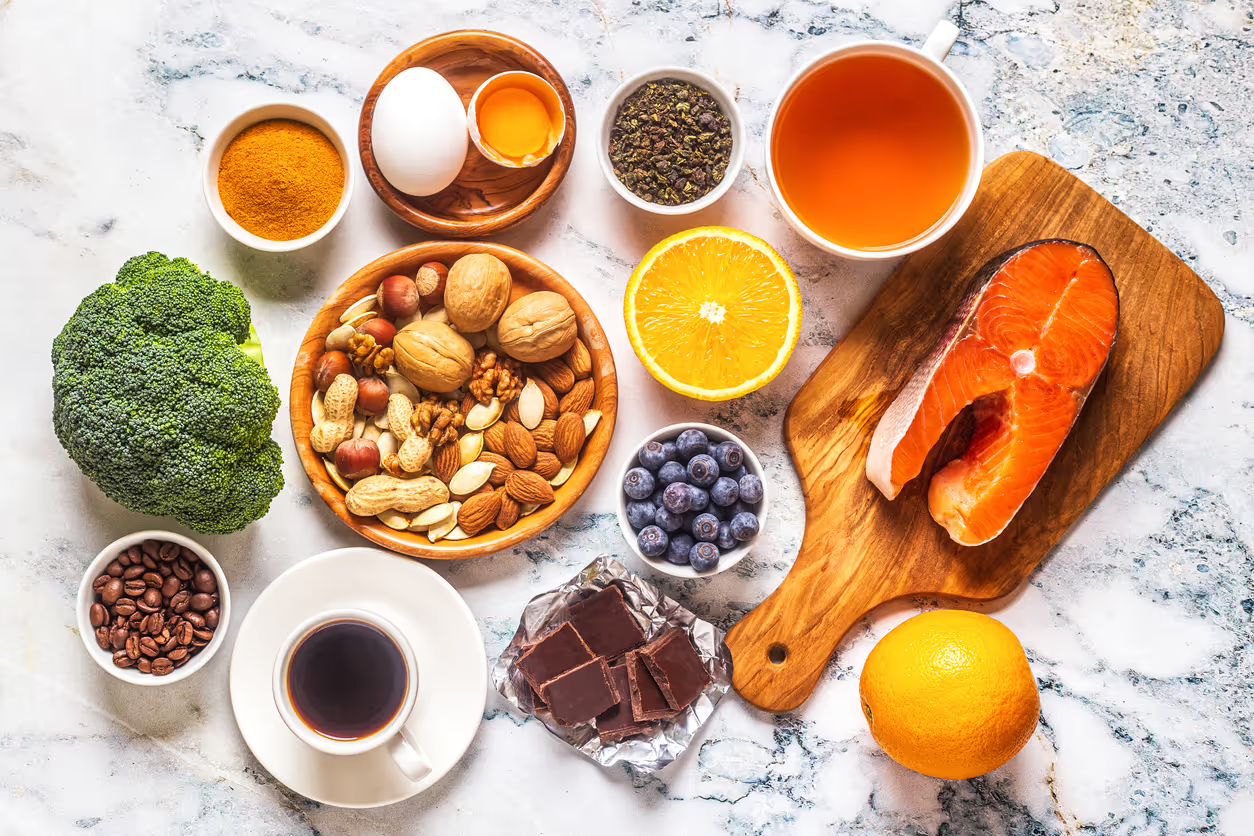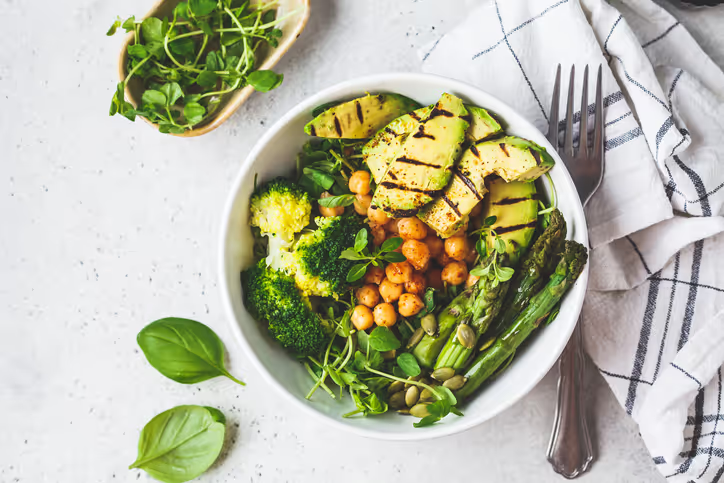Ever wonder what are the best anti–aging foods? This article explores how to nourish your body well to keep it feeling younger, while improving your health and longevity. Although your overall lifestyle benefits your total body health, there are foods that may prevent premature aging and improve life quality. This article will delve into the best anti-aging foods and how they can be beneficial in slowing the progression of the aging process.
What are anti–aging foods?
Anti-aging is defined by the Merriam-Webster dictionary as “used or tending to prevent or lessen the effects of aging.” What you eat can play a role in how you age. Some foods are pro-inflammatory, such as highly processed, salty, fatty, fried, and sugar-laden foods. Inflammation can wreak havoc in the body by damaging cells and organ systems leading to premature aging and chronic diseases, such as heart disease, Type 2 diabetes, certain cancers, and autoimmune diseases. On the other hand, the best anti–aging foods are anti–inflammatory and can boost longevity.
Nutrition science reveals that dietary patterns can play a role in anti–aging and the best anti–aging foods benefit the body by:
- keeping bones strong
- building and maintaining muscle mass
- protecting cells from damage
- maintaining the integrity of our skin to fend off wrinkles
- optimizing brain function and health
- stabilizing blood sugar to fend off Type 2 diabetes
- maintaining heart and kidneys to fend off disease
- supporting a healthy gut microbiome and immune system
10 best anti–aging foods
When it comes to healthy anti–aging foods, there are certain foods to keep on your radar, however, this is by no means an exhaustive list. The foods outlined below serve as a jumping off point to get you started with managing your well-being through nutrition. Keep in mind, nutrients work synergistically and no one food is a magic bullet alone. When eaten in combination with other nourishing foods, they can offer healthy, healing properties including anti-aging benefits.
Dark chocolate
A simple way to nourish your sweet tooth is with dark chocolate. Dark chocolate is one of the best anti–aging foods as it has been considered a ‘functional food’ for thousands of years. The Aztecs used it as a drug to increase longevity, sexual appetite, and fertility. More recently, dark chocolate has been shown to prevent diabetes, inflammation, and harmful infections from pathogens and has been shown to play a role in weight management.
The higher the cacao content of dark chocolate the better as there’s less saturated fat and sugar, plus it contains a myriad of bioactive components, such as polyphenols, flavonoids, procyanidins, theobromines, as well as vitamins and minerals. Eating an ounce of dark chocolate a day has been shown to benefit the immune system, as well as fend off cardiovascular diseases, certain types of cancer and brain-related disorders like Alzheimer’s disease and Parkinson’s disease. Choose dark chocolate with 70% cocoa or higher to reap the most health benefits and monitor your intake as dark chocolate contains caffeine, so limit your consumption if you’re caffeine-sensitive, pregnant and/or breastfeeding.
Avocado
The alligator pear or avocado is a great choice when it comes to healthy anti–aging foods. Considered a “superfood”, the avocado has been shown to offer a vast array of health benefits. Compared to other berries - the avocado is a berry with a single large seed - it contains unique nutritional and phytochemical composition. Originally from Mexico and Central America, the avocado has shown great promise in the prevention and treatment of oxidative stress and age-related degenerative diseases, such as cancer, diabetes, inflammatory, microbial, and cardiovascular diseases. Research suggests that eating avocados with other fruits and vegetables may improve the bioavailability of nutrients from other plant-based foods.
From a nutrition standpoint, avocados are jam-packed with fiber, contributing to a healthy gastrointestinal tract, keeping cholesterol levels in check, and preventing constipation. Plus, avocados contain prebiotic fibers, which helps diversify the gut microflora by feeding the good bacteria in your gut. The protein content of an avocado is higher than any other fruit giving it a slightly higher thermic effect, which may boost metabolism slightly, boding well for those trying to lose weight. Avocados are high in “good” monounsaturated fat, which keeps the heart, brain, and cells in good working order. Plus, avocados are low in sodium and high in potassium - the perfect mineral proportion for keeping blood pressure in a normal range.
Green tea
Tea is the most popular beverage in the world, after water. Green tea comes from the leaves of the Camellia sinensis plant. There are several forms of green tea including white, green, oolong, and black. The aroma and beneficial compounds in green tea come from polyphenols; one in particular is called epigallocatechin-3-gallate (EGCG), which makes it one of the best anti–aging foods. Research shows that one cup of green tea contains up to 200 mg of EGCG, which has been shown to help prevent several types of cancers, such as lung, colorectal, skin, and prostate cancer. The recommendation for green tea consumption is three to five cups per day. Green tea has also been shown to reduce the risk of Type 2 diabetes, cardiovascular disease, and neurological diseases.
Be aware that green tea contains astringent compounds called tannins that may interfere with the intestinal absorption of some nutrients and medications. It’s best to drink green tea with a meal or a snack as drinking it on an empty stomach may be toxic to the liver and may upset the gastrointestinal tract. Pregnant and breastfeeding women should avoid green tea as a precaution against nutritional deficiencies.
Flax seed
One of the best anti–aging foods is flax seed. This tiny, hard seed contains healthy omega-3 fats called alpha-linolenic acid (ALA), lignans, and fiber, which has been shown to help reduce the risk of type 2 diabetes by reducing blood glucose in subjects with type 2 diabetes and prediabetes. Plus, flax seed has shown to benefit heart health by reducing blood pressure in patients with arterial disease. The evidence around flax seed and cancer prevention is well documented, especially for breast cancer. Flax seed lignans or nonsteroidal phytoestrogens act like the hormone estrogen in the body and breast cancer cells have shown to be inhibited by flaxseed lignans. In addition, flax seed has been shown to help minimize menopausal symptoms, such as hot flashes. ALA from flax seed oil has been shown to positively affect skin health by hydrating and smoothing out skin, therefore reducing signs of aging.
Flax seed comes in four common forms: whole, ground, oil, and meal. Grinding whole flaxseed right before eating is best as it allows the ALA to be more easily absorbed in the gastrointestinal tract. Since it has a high fat content, it can be susceptible to going rancid and/or producing a bitter aroma and flavor. Flax seed is best stored in a cool, dry place or in the refrigerator to maximize flavor, texture and maintain its health benefits. Aim for 2 - 3 tablespoons a day of flax seeds for optimal health benefits.
Olive Oil
Olive oil is a staple in the Mediterranean diet – a diet known for its longevity benefits. Extra virgin olive oil (EVOO) is particularly rich in polyphenols, which are plant-based compounds that are believed to support the immune system and reduce morbidity (death). Polyphenols can also slow down the development of cardiovascular and neurodegenerative diseases. The high amount of polyphenols in EVOO makes it a high antioxidant food, which protects cells from free radical damage and fends off inflammation in the body keeping cells functioning optimally and less susceptible to premature aging. Research has shown that olive oil consumption can prevent certain cancers, such as colorectal, breast, and skin cancers.
Olive oil is one of the best anti–aging foods and a great substitute for butter, margarine, and mayonnaise, however it does have 150 calories per tablespoon. So, how much olive oil should you eat daily to reap the anti-aging benefits? Research revealed that eating just half a tablespoon of (EVOO) can lower risk of heart disease by 5% to 7% and was associated with less inflammation in the body as well as lower cholesterol levels.
Berries
Whether you choose blackberries, raspberries, strawberries, or blueberries, they all have anti–aging properties. Berries help keep your cells young with a vast array of plant-based compounds. Berries, in particular blueberries, are loaded with anthocyanins, which are the antioxidants found in the pigment of their skin. Berries help keep your heart healthy by keeping blood pressure and cholesterol levels in a normal range, which are two biomarkers that can increase with age. Berries have been shown to reduce oxidative stress and inflammation, which can lead to Type 2 diabetes, cardiovascular disease, and cancer.
Berries are one of the best anti–aging foods for your brain. Whether fresh, frozen or freeze-dried, the polyphenols in berries have been shown to fend off memory loss, improve cognition and decrease the risk of Alzheimer’s disease. Research from the MIND Diet revealed that eating blueberries once a week or more improved cognitive function, resulting in brain function that was three and a half years younger than in those who didn’t eat blueberries as much!
Nuts
A staple of the Mediterranean diet, tree nuts, such as almonds, hazelnuts, cashews, Brazil nuts, walnuts, and pistachios, as well as legume seeds like peanuts are among the best anti–aging foods. Nuts make a nutrient dense contribution to meals and snacks as they contain healthy fats, protein, fiber, a myriad of beneficial vitamins and minerals, as well as antioxidants and phytosterols.
Nuts, such as almonds, have been shown to reduce blood glucose after a meal and increase satiety in people who are at risk for type 2 diabetes. Although nuts are high in calories, studies have shown that nut consumption does not cause weight gain. An ounce of nuts a day can have great anti–aging benefits, such as increasing good cholesterol levels and reducing total cholesterol levels, improving cognitive health and insulin levels, as well as reducing risk for certain cancers and fending off inflammation to keep your cells and organs functioning optimally.
Cruciferous vegetables
From broccoli to Brussels sprouts, and cauliflower to kale, cruciferous vegetables from the Brassica family top the list of healthy anti–aging foods. Jam-packed with fiber and numerous plant-based compounds, such as phenolics, glucosinolates, as well as antioxidants, carotenoids, tocopherols, and vitamin C, cruciferous vegetables fend off chronic diseases particularly cardiovascular diseases and several types of cancer, including colorectal cancer.
These nutrient dense plants are hydrating and pack a high fiber punch with very few calories making them perfect foods to aid in weight loss. Adults should aim to get at least 3 cups of vegetables daily, including cruciferous ones, to prevent chronic diseases and premature aging.
Fatty fish
Cold-water fish, such as salmon, halibut, tuna, mackerel and sardines contain high amounts of omega-3 fats called eicosapentaenoic acid (EPA) and docosahexaenoic acid (DHA) making them healthy anti–aging foods. These long-chain fatty acids are revered for their health benefits for reducing the risk of inflammatory diseases, such as cardiovascular disease, Type 2 diabetes and age-related cognitive decline. The 2020 Dietary Guidelines for Americans recommends that adults eat two - 6oz. servings of fatty fish per week. Plus, adding more protein-rich foods is satiating and can help with weight loss.
Have a fish allergy? Vegan? Use fish oil supplements derived from marine algae to get your daily dose of therapeutic omega-3 fats. Be sure the supplement comes from a reputable source and has a third party verification (i.e., NSF, USP, CL, UL, etc.) on the product label.
Collagen peptides
Collagen makes up your joints, bones, and skin. With age, collagen production slows down and therefore adding collagen peptides to your diet (or smaller molecules of collagen protein made from animal collagen) can be among one of the healthy anti–aging foods. Research shows that consuming collagen peptides regularly helps reduce and prevent joint pain, bone density loss, and skin aging. Adding collagen peptides into your daily diet has been shown to improve skin hydration and elasticity, which may reduce fine lines and wrinkles. Keep in mind, vitamin C-rich foods aid in the production of natural collagen in your body.
Dosages of collagen peptides vary in studies, but up to 10 grams daily has shown to be safe and effective. Look for collagen peptide products from credible manufacturers with at least one third party verification on product labels. Women who are pregnant and/or breastfeeding should avoid use.
How to use anti–aging foods
Now that you know some of the best anti–aging foods, here are some simple ways that you can include them into your daily eating plan.
- Add a scoop of collagen peptides into a berry and kale smoothie in the morning.
- Bake salmon with broccoli and cauliflower florets drizzled with extra virgin olive oil, garlic, and a pinch of salt and pepper for a simple sheet pan dinner.
- Chop a handful of nuts and toss them into a mixed greens and berry salad.
- Sprinkle ground flax seeds into plain Greek-style yogurt with berries.
- Spread a slice or two of ripe avocado on whole grain toast and top with a sunny side up egg.
- Enjoy a cup of green tea with an ounce of dark chocolate for a midday boost.
Although incorporating anti–aging foods can contribute to health and longevity, a balanced lifestyle makes a big difference. Getting mindful movement throughout the day, drinking enough water, and getting good quality sleep all play a role in overall health over the long run. Focusing on your self care routine coupled with nourishing your body well can do wonders in adding years to your life.
Ageless beauty on your plate: Transform your diet with anti–aging foods
Along with a healthy, balanced lifestyle, anti–aging foods can make a great addition to your diet. Remember weight loss is a byproduct of nourishing your body well. So take the time to pile your plate with a bevy of colorful fruits and veggies, seek out good quality proteins, healthy fats, and fiber-filled nuts and seeds. Although this is a great place to start, consulting with weight loss experts at Form Health can maximize your weight loss efforts.
Form Health provides individualized nutritional guidance along with expert medical care to assist in your weight loss efforts. When you join Form Health, you will be paired with a board certified doctor and Registered Dietitian who will create a personalized plan just for you. To get started, take our online quiz.




